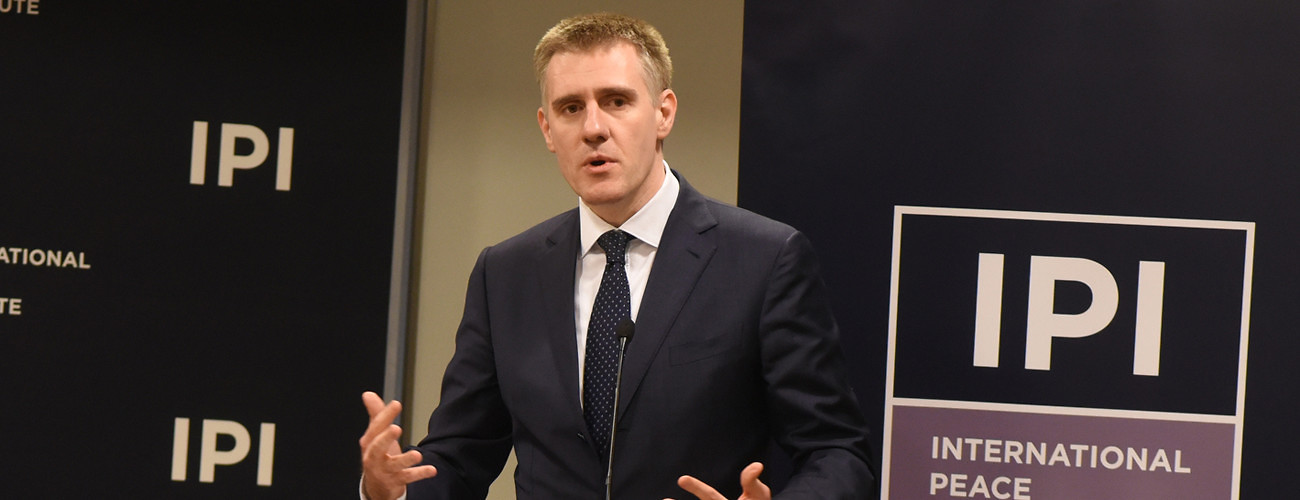Regional organizations can go a long way in supporting global peace and security because they can provide the UN system with regional expertise as well as local knowledge of regional crises, Foreign Minister and Deputy Prime Minister Igor Lukšić of Montenegro said at IPI on March 5th.
Mr. Lukšić was speaking at an event entitled “Achieving Peace and Security Through Regional Cooperation: The Perspective of a Small State.”
The discussion was moderated by IPI Vice President Hardeep Singh Puri, who is also the secretary-general of the Independent Commission on Multilateralism (ICM), a newly launched initiative that seeks to provide recommendations aimed at strengthening the multilateral system.
In making his case, Mr. Lukšić recalled the important role played in the 1990s by the European Union and the Organization for Security and Co-operation in Europe (OSCE) in helping defuse the conflict that enveloped the Western Balkans at the time. A similar dynamic, he said, can be applied today, including in the ongoing crisis in Ukraine.
“Regardless of the devastating events that countries from our region share, we have risen to the point where we share goals that bind us,” Mr. Lukšić said. Similarly, he argued, the parties involved in the conflict in Eastern Ukraine should build on any peace deal brokered by regional players and move toward restoring mutual trust.
“Like the Dayton Accords [of 1995], the Minsk Protocol is an important first stage, and obviously, a necessary one,” he said. “But it’s only a small step [and] sooner or later the sides will have to start talking about more lasting solutions.”
Mr. Lukšić was referring to the initial cease-fire agreement signed in the Belarusian capital of Minsk in September 2014 under the auspices of the OSCE. The deal was meant to end the conflict that has raged between the Ukrainian government and Russia-backed separatists over control of Eastern Ukraine since the ouster of former Ukrainian president Viktor Yanukovych in early 2014. After multiple cease-fire violations, the parties met again in Minsk on February 12th and signed what is now known as Minsk II—this time through the brokerage of the governments of France, Germany, and Russia.
The conflict, which according to UN estimates has now killed over 6,000 people, shows how in such situations everybody loses, Mr. Lukšić said. “The only way forward is to stick to real diplomatic talks, trying to understand each other’s positions,” he continued.
This is where regional organizations can play an important role, the foreign minister said. Regional organizations can provide that level of local knowledge that can greatly enhance the chances of reconciliation at an early stage, something a global organization like the United Nations is not best suited for, he explained.
“There is a lot of space and at the same time a growing need for regional and sub-regional organizations to play an active role in assisting as well as in leading efforts with a view to help secure peace and stability,” he said.
Mr. Puri made a similar point when he highlighted the comparative advantage that regional organizations enjoy when it comes to tackling local crises.
“It stands to reason that countries that operate in a region or sub-region know each other more intimately, know what the issues are,” he said. “It’s better that those challenges that occur between them are looked at in the first instance at the regional level with a view to finding solutions, rather than bringing a whole new set of regional issues to the UN.”
That’s particularly the case when crises tackled by the UN elicit the wrong response, Mr. Puri added. “It is a matter of regret,” he said, “that every time we look at a crisis, our default response seems to go straight to Chapter VII,” referring to the provision in the UN Charter that enables the Security Council to authorize the use of force.
Instead, the focus needs to be on mediation, a point stressed by both Mr. Puri and Mr. Lukšić. “Mediation is the best tool at our disposal,” Mr. Lukšić said. “It rightfully deserves increased attention as well as resources from the international community so that it can be established as a core function of the UN.”
However, while regional organizations may be best suited to tackling local issues, sometimes crises get out of hand. Mr. Lukšić said this is where the United Nations, as the best repository of multilateralism, can step in. In the 70 years since its inception, he noted, the UN has played a “vital” and “indispensable” role in ensuring global peace and security, development, and respect for human rights.
“The UN is the central platform for providing joint coherent responses to the contemporary complex challenges that are truly global in nature, crossing national borders,” he said. “No single country is in the position to address them comprehensively, regardless of how economically powerful [it might be].”
Watch event:








